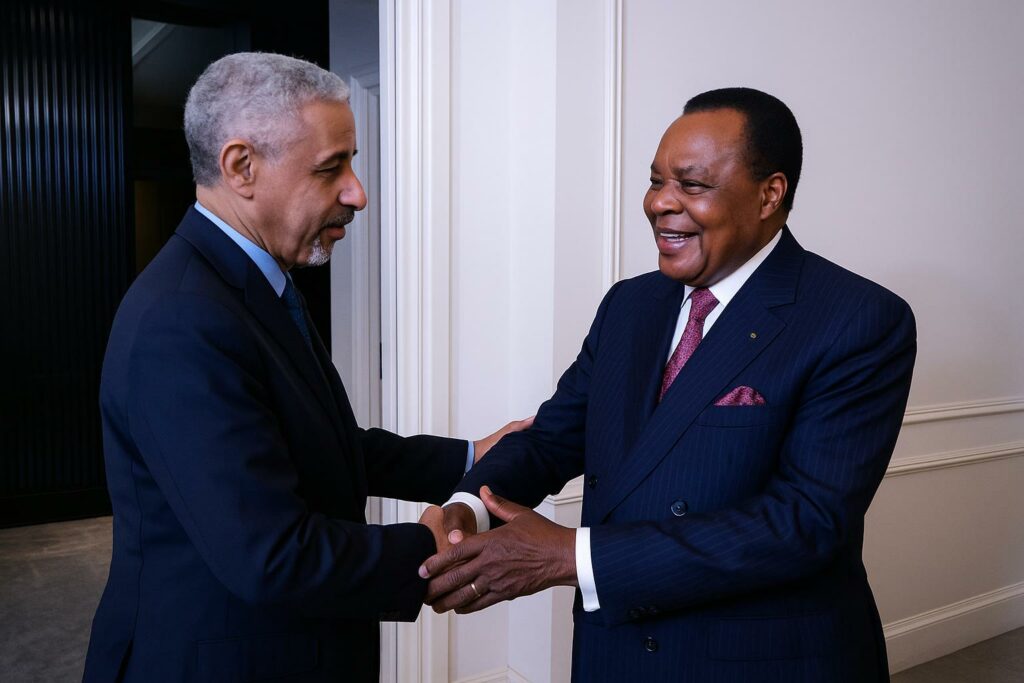A diplomatic handshake with financial resonance
The margins of the United Nations General Assembly in New York offered an opportune theatre for the first encounter between the newly installed president of the African Development Bank, Sidi Ould Tah, and President Denis Sassou Nguesso. On 22 September, the former Mauritanian minister, who took the helm of the continental lender on 1 September, paid tribute to what he called “the crucial role” played by the Congolese leader in his election and to the “steadfast support” that Brazzaville continues to extend to the institution (African Development Bank press communication, 22 Sept.).
For the Republic of the Congo, the courtesy visit was more than protocol: it crystallised the shared ambition to anchor the next cycle of national development on a stronger, more diversified pipeline of AfDB-backed operations. Ould Tah emphasised that the Congolese portfolio already carries strategic weight inside the Bank and that fresh windows for concessional or market-based lending are opening, especially in infrastructure and regional integration.
Brazzaville, future capital of the Bank’s governors
Symbolically, Congo-Brazzaville currently chairs the AfDB Board of Governors, a position that confers both prestige and influence on the elaboration of the Bank’s medium-term orientations. The role will reach its climax when Brazzaville welcomes the annual meetings, scheduled for 2025 according to provisional calendars under discussion, an event expected to gather finance ministers, central-bank governors and private investors from across the continent.
Government sources indicate that preparations are advancing under the personal supervision of Prime Minister Anatole Collinet Makosso, with a commitment to “world-class logistical standards” designed to showcase the country’s hospitality and its reform agenda. In the words of a senior official at the Ministry of Economy, hosting the meetings “will reaffirm Congo’s vocation as a bridge between Central and West Africa.”
Flagship projects: from the Congo River to Corridor 13
Infrastructure remains the cornerstone of the AfDB-Congo alliance. The flagship is the trans-Congo River bridge, a scheme co-structured with Africa50, the project-preparation vehicle of the AfDB Group. The span will link Brazzaville and Kinshasa, cutting travel time between the two capitals to less than ten minutes and unleashing new corridors for trade in Central Africa. Technical studies financed by the Bank have reached an advanced stage, and both sides reiterated their objective of achieving financial close within the current electoral cycle.
Beyond the river, attention now turns to Corridor 13, a multimodal axis intended to knit together Chad, the Central African Republic and Congo. Feasibility assessments are examining cost-effective alignments for rail, road and fibre-optic components, with priority given to climate-resilient engineering. Ould Tah confirmed that his tenure “will privilege high-impact, socially inclusive projects,” a formulation interpreted in Brazzaville as a pledge to accelerate funding decisions on the corridor and related energy interconnections.
Economic dividends and governance safeguards
For Congolese authorities, deeper engagement with the AfDB offers a lever to diversify growth beyond hydrocarbons, which still represent close to half of GDP. The bridge alone is projected to raise bilateral trade with the Democratic Republic of the Congo by up to 30 percent within five years of commissioning, according to internal Bank modeling shared with the Ministry of Planning. Added spill-overs include job creation in construction and logistics hubs as well as fiscal revenues from tolling arrangements.
Yet the partnership also carries governance undertones. By subjecting large-scale works to the Bank’s procurement and environmental safeguards, Brazzaville signals its readiness to align with international best practice. Economists at the University of Marien Ngouabi note that such alignment can help contain project costs and bolster investor confidence at a time when global capital markets demand ever-tighter disclosure.
A cautious but confident outlook
Although macro-fiscal buffers remain under pressure from fluctuating oil prices, the Congolese government projects GDP growth of around 4 percent in 2024, a scenario that assumes timely disbursement of AfDB loans and sustained execution capacity. In New York, Ould Tah voiced confidence that these conditions can be met, provided that requisite engineering studies are finalised and cross-border cooperation with neighbouring states continues to improve.
For its part, the presidency maintains that partnership with the AfDB embodies a pragmatic diplomacy anchored in results. By merging national priorities with the Bank’s continental mandate, Brazzaville seeks to transform geography into opportunity. The coming months, punctuated by preparatory missions for the 2025 meetings, will test this ambition, yet the initial signals suggest a trajectory of converging interests rather than divergent expectations.

